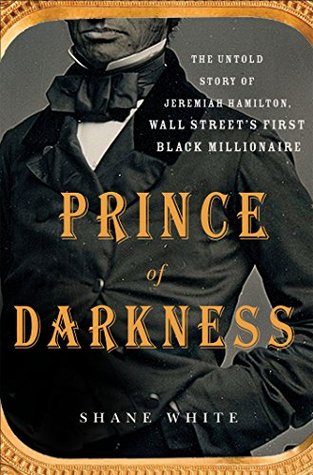More on this book
Kindle Notes & Highlights
by
Shane White
Read between
December 2, 2022 - December 11, 2024
(in 1870 the categories of Chinese and Indian were added).
Hamilton had nothing to do with African Americans and did not write checks to underwrite the activities of the early civil rights activists.
Hamilton knew very well that when New York eventually erupted into a racial firestorm, a black man as prominent as he was had to become invisible—quickly.
he was both a black man on Wall Street and someone who remained familiar with the fulminations of Bacon, Bolingbroke and Milton about the corruption of commerce.
he had not paid the par value of $100 but had taken “calls upon each share of said stock to the sum of seventy five dollars.”
In the years after the panic of 1837, Americans were learning how to exploit business failure, to make money out of the inevitable downturns, disasters and mistaken ventures
he was also a pioneer in the early stages of the development of what would later be known as vulture capitalism.
Hamilton sued “the Accessory Transit Company, Cornelius Vanderbilt, Charles Morgan and others.”
Vanderbilt dominated New York’s financial sector in the decades in which Jeremiah Hamilton, younger by some thirteen years, was active as a broker.
Vanderbilt deliberately drove up or down the price of Accessory Transit stock to suit his own purposes.
president of the Republic of Nicaragua, Patricio Rivas, who was essentially a puppet of William Walker, issued a decree dissolving the Accessory Transit Company.
in the wake of Vanderbilt’s death, at least two writers canvassed the issue of “the Nicaragua transit business.”
Historians should never admit to their febrile imaginings,
margin lending—a speculator would lodge other stock, bonds, or even cash with Hamilton as security and then borrow more than the security was worth to purchase shares. It was a way for an individual not only to use money he had tied up in other assets, but also to leverage it.
Draft Riots, New York’s own cataclysm, in which the mutilated bodies of African Americans were hanged from lampposts,
the Times reporter’s enjoyment in flaying the stubborn backwardness of the railroad led him to underestimate seriously how deep-seated the prejudice against African Americans remained in New York.
New York’s prosperity had depended on the slave South. For decades now, its banks had financed the cotton crop and the purchase of land and slaves; its merchants had dominated the shipping of cotton across the Atlantic; its manufacturers and middlemen had dispatched clothing, shoes, and hats, as well as hoes and axes, to southern planters for their slaves.
The Draft Riots were a great opportunity to settle scores and put any uppity black in his place.
in early August, a few weeks after the riot, a New York Tribune writer reported that “a large number of colored families have left the city with the intention of never returning to it again.”33 By the time of the 1865 census the city’s African American population had dropped below 10,000 individuals for the first time since the mid-1810s.
Hamilton and his family turned up in the City of Light as the Franco-Prussian War was reaching its conclusion. On August 18, probably about the time the Hamiltons set foot in the city, the French forces were defeated at the Battle of Gravelotte,
Before the founding of the New York Public Library in 1895, the Society Library was the most important library in the city, containing in 1856 some 35,000 volumes.
—Thomas Hobbes had an even grimmer view of the natural state of man than Bolingbroke or Bacon, and he anatomized the understanding of self-interest that would, in time, be foundational to the development of capitalism.


